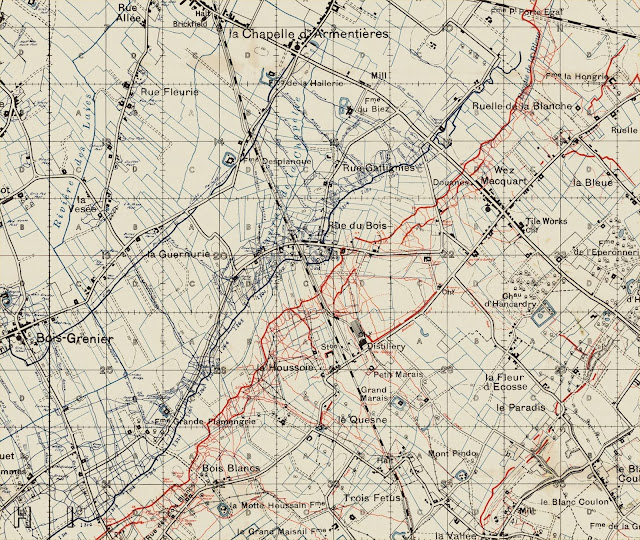The next three days saw a marked increase in German artillery activity, which many in the British lines associated with the fact that 27th January had been the Kaiser’s birthday. Whatever the truth of their belief, the intensification began in the early hours of 28th with a heavy bombardment of the support and reserve lines which caused some damage but no casualties. From 9 am the bombardment gradually increased in ferocity. At first it was described as “not over intense, it is regular and is somewhat difficult to understand as they don't appear to have a definite object in view”, but as the day progressed, “The bombardment has become more intense, the Germans must have been registering during the morning. They gradually brought more guns to bear until eventually it became a perfect hurricane.” It was estimated that more than 4,000 shells were fired by the Germans against the 2,000 yards or so of the Divisional front during the course of 27th – 28th and in response, “on this, as on every occasion, our ammunition expenditure in reply was made to exceed the enemy’s”. The result for the men in the trenches was described with typical understatement, “The 16th Royal Scots are having a rather rough time of it as this is their first experience under fire”. Remarkably only one man from the 10DWR and one from the Royal Scots were killed and only two others wounded. Pte. George William Elliott (3/11599), 10DWR, and Pte. Robert G. Russell (19632), 16th Royal Scots, were both buried at Brewery Orchard Cemetery, Bois Grenier. George William Elliott was originally from Rothwell, but had been living in Bingley and working as a boatman on the Leeds-Liverpool Canal; he had enlisted aged 24 and was married, with one daughter. The circumstances of Pte. Russell’s burial are described by Jack Alexander in his excellent book, McCrae’s Battalion. Two other men from 10DWR were wounded. Pte. Vernon Barker (see 21st March 1915) suffered shrapnel wounds to his left thigh; he would be admitted via 69th Field Ambulance and 8th Casualty Clearing Station at Bailleul to 1st Canadian General Hospital in Etaples. Pte. Fred Haywood was also wounded; in the absence of a surviving service record the details of his wounds and treatment are unknown, but at some point he would be transferred to 4th Stationary Hospital in Arques.
Pte. George Edward Bush (see 18th October 1915) described the events in a letter home, “It was the Kaiser’s birthday recently and our Battalion got to know about it too as the Huns opposite decided to celebrate it by giving us a particularly lively day. They commenced early, about 4am, by ‘strafing’ us severely with ‘whizz bangs’. These are very spiteful little shells, as they arrive without any warning and only just skim the parapet. Of course, it’s the same for both sides, but very unpleasant for the poor infantryman in the front line when the artillery have these mad half hours. We are powerless to act in any way. All we can do is lie low and be pelted with Krupp’s ‘instruments of hate’”.
A payment of £4 9s. 9d was authorised, being the amount outstanding in pay and allowances to the late Sgt.Charles McCusker (see 13th November 1915), who had been killed in an accident at the Brigade bomb school in November 1915; the payment would go to his widow, Lilian.
 |
| Sgt. Charles McCusker |

No comments:
Post a Comment